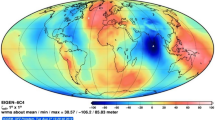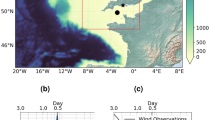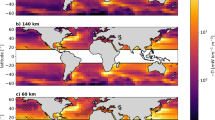Abstract
FOR the component of steady flow at right angles to the pressure gradient on a rotating globe, the hydrodynamical equation may be written. where u is the velocity of flow, ∂p/∂y the pressure gradient, φ latitude, ρ density, ω the angular velocity of rotation of the earth, and F any extraneous forces apart from pressure, for example, that due to wind friction at the surface of the ocean. In a paper on the effect of wind on ocean currents1, I found empirically that the surface current due to wind flowed on the average at an angle of about 45° to the wind with a velocity that of the wind generating the current.
This is a preview of subscription content, access via your institution
Access options
Subscribe to this journal
Receive 51 print issues and online access
$199.00 per year
only $3.90 per issue
Buy this article
- Purchase on Springer Link
- Instant access to full article PDF
Prices may be subject to local taxes which are calculated during checkout
Similar content being viewed by others
References
Ashby, E. (1946), "Survey of Botany in the Soviet Union". Rep. 25th Meeting Austr. & N.Z. Ass. Adv. Sci., Adelaide, 1946, p. 245.
Ashby, E. (1947), "Scientist in Russia", London, Penguin Books, Ltd.
Ashby, E. (1948), "Genetics in the Soviet Union". Nature, 162, p. 912.
Crane, M. B. (1949), "Lysenko on Grafting and Genetics". Discovery, 10 (2), p. 64.
Dale, H. H. (1949), Discovery, 32 (Jan. 1949.)
Darlington, C. D. (1944), "Heredity, Development and Infection". Nature, 154, p. 164.
Darlington, C. D. (1947), "A Revolution in Soviet Science". J. Hered., 38 (5), p. 143.
Darlington, C. D. (1948), "The Plasmagene Theory of the Origin o Cancer". Brit. J. Cancer, 2, p. 118.
Dobzhansky, T. (1949), "The End of Genetics in the Soviet Union". Bull. Atom. Scientists, 5 (5), p. 144.
Goldschmidt, R. (1949), "Research and Politics". Science, 109, p. 219.
Harland, S. C. (1949), Discovery, 32 (Jan. 1949.)
Hudson, P. S., and Richens, R. H. (1946), "The New Genetics in the Soviet Union". Plant Breeding Abstracts, 16, p. 365.
Kaftanov, S. (1948), "In support of Michurin's Biological Theory in Higher Institutions of Learning". Izvestia, Sept. 8, 1948 (verbatim translation in Science, Jan. 28, 1949, 109, p. 90.
Lysenko, T. D. (1943), "Heredity and its Variability" (Russian); English translation by Th. Dobzhansky, 1946; New York, Columbia Univ. Press.
Lysenko, T. D. (1948), (Report and concluding remarks at the 1948 session of the Academy of Agricultural Sciences.) (a) "Soviet Biology" (English). London, Birch Books, Ltd.; New York, International Publishers, with title "The Science of Biology To-day"; (b) In ref. 2, Europe, 26, p. 30, p. 142 (French).
Muller, H. J. (1948), "The Destruction of Science in the U.S.S.R.", etc., Sat. Rev. Literature, Dec. 4, 1948, p. 13; Dec. 11, 1948, p. 8.
Author information
Authors and Affiliations
Rights and permissions
About this article
Cite this article
DURST, C. Slope of the Ocean. Nature 163, 993–994 (1949). https://doi.org/10.1038/163993b0
Issue Date:
DOI: https://doi.org/10.1038/163993b0
Comments
By submitting a comment you agree to abide by our Terms and Community Guidelines. If you find something abusive or that does not comply with our terms or guidelines please flag it as inappropriate.



